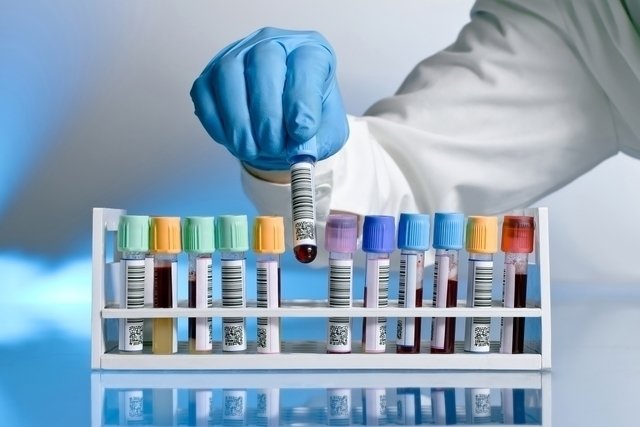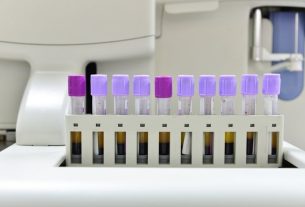Thyroid antiperoxidase, also called anti-TPO, is an antibody produced by the immune system that attacks the thyroid gland, resulting in changes in the levels of hormones produced by the thyroid.
Anti-TPO values vary from laboratory to laboratory, and are generally considered increased when it is above 35.0 IU/mL, which is usually indicative of changes in the thyroid, including autoimmune diseases, such as Hashimoto’s thyroiditis. and Graves’ disease.
However, the amount of this thyroid autoantibody can increase in several situations, so it is important that the diagnosis is made taking into account the results of other thyroid-related tests, such as other thyroid autoantibodies and TSH, T3 and T4 levels. Find out about the tests that are recommended to evaluate the thyroid.

Reference value
The reference value considered normal for anti-TPO is less than 35.0 IU/mL, however the reference value may vary depending on the laboratory, as different dosages may be taken, which may alter the value considered normal. Therefore, when analyzing the exam results, it is important to pay attention to the reference value indicated in the exam report.
Therefore, thyroid antiperoxidase results above 35.0 IU/mL are possibly indicative of thyroid changes, and it is important that the result is evaluated by the doctor together with the results of other requested tests.
What can be high anti-TPO
In general, anti-TPO is considered high when a concentration above 35.0 IU/mL is found in the blood, which may be indicative of:
1. Tireoidite de Hashimoto
Hashimoto’s thyroiditis is an autoimmune disease in which the immune system attacks the thyroid, dysregulating the production of thyroid hormones and resulting in symptoms of hypothyroidism, such as excessive tiredness, weight gain, muscle pain and weakening of hair and nails.
Hashimoto’s thyroiditis is one of the main causes of increased thyroid antiperoxidase, however more tests are necessary to complete the diagnosis. Learn more about Hashimoto’s thyroiditis.
2. Graves’ disease
Graves’ disease is one of the main situations in which thyroid antiperoxidase is high and it happens because this autoantibody acts directly on the thyroid and stimulates the production of hormones, resulting in characteristic symptoms of the disease, such as headache, wide eyes, weight loss , sweating, muscle weakness and swelling in the throat, for example.
It is important that Graves’ disease is identified and treated correctly to alleviate the symptoms, with the treatment indicated by the doctor depending on the severity of the disease, and the use of medication, iodine therapy or thyroid surgery may be recommended. Find out more about Graves’ disease and how it is treated.
3. Pregnancy
Due to common hormonal changes during pregnancy, it is possible that there are also changes related to the thyroid gland, including increased levels of thyroid antiperoxidase in the blood.
Despite this, pregnant women do not necessarily have changes in their thyroid. Therefore, it is important to take anti-TPO at the beginning of pregnancy so that the doctor can monitor the levels during pregnancy and check the risk of developing thyroiditis after childbirth, for example.
4. Subclinical hypothyroidism
Subclinical hypothyroidism is characterized by a decrease in the activity of the thyroid gland that does not generate symptoms and is only detected through blood tests, which verify normal levels of T4 and an increase in TSH.
Although anti-TPO dosage is not normally indicated for diagnosing subclinical hypothyroidism, the doctor may request this test to assess the progression of hypothyroidism and check whether the person is responding well to treatment.
This is possible because this antibody acts directly on the enzyme that regulates the production of thyroid hormones. Therefore, when measuring thyroid antiperoxidase in subclinical hypothyroidism, it is possible to check whether the decrease in the amount of anti-TPO accompanies the regularization of TSH levels in the blood.
Learn how to recognize and treat hypothyroidism.
5. Family history
People who have relatives with autoimmune thyroid disease may have altered anti-thyroid peroxidase antibody levels, which does not indicate that they also have the disease. Therefore, it is important that the value of anti-TPO is evaluated together with other tests requested by the doctor.
How to download anti-TPO
To lower the concentration of thyroid antiperoxidase, it is important to follow your doctor’s instructions. This is because the recommended treatment for the cause of the change is sufficient to regularize the concentration of circulating anti-TPO.
We regularly update our content with the latest scientific information, so that it maintains an exceptional level of quality.
Bibliography
- THYROID DEPARTMENT – BRAZILIAN SOCIETY OF ENDOCRINOLOGY AND METABOLOGY. Questions and Answers: Exams. Available at: <https://www.tireoide.org.br/para-o-publico/perguntas-e-respostas/perguntas-e-respostas-exames/>. Accessed on Nov 4, 2022
- WILLIAMSON, Mary A.; SNYDER, Michael. Interpretation of laboratory tests. 9th edition. Guanabara Koogan, 2013.
- CARVALHO, Gisah A.; PEREZ, Camila LS; WARD, Laura S. Use of thyroid function tests in clinical practice. Arq Bras Endocrinol Metab. Vol 57. 3 ed; 193-204, 2013
- Jose Gilberto H. Scallop Teresa S. Kasamatsu Omar M. Hauache Rui MB Maciel VIEIRA, Jose Gilbert H.; KASAMATSU, Teresa S.; HAUACHE, Omar M.; MACIEL, Rui MB Anti-Thyroid Antibodies: Methodological Aspects and Diagnostic Importance. Arq Bras Endocrinol Metab. Vol 47. 5 ed; 612-621, 2003

Sign up for our newsletter and stay up to date with exclusive news
that can transform your routine!
Warning: Undefined array key "title" in /home/storelat/public_html/wp-content/plugins/link-whisper-premium/templates/frontend/related-posts.php on line 12
Warning: Undefined array key "title_tag" in /home/storelat/public_html/wp-content/plugins/link-whisper-premium/templates/frontend/related-posts.php on line 13



